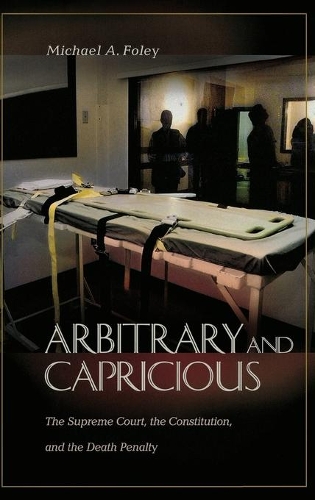
Arbitrary and Capricious: The Supreme Court, the Constitution, and the Death Penalty
(Hardback)
Publishing Details
Arbitrary and Capricious: The Supreme Court, the Constitution, and the Death Penalty
By (Author) Michael A. Foley
Bloomsbury Publishing PLC
Praeger Publishers Inc
30th June 2003
United States
Classifications
General
Non Fiction
345.730773
Physical Properties
Hardback
264
Description
Justice Marshall once remarked that if people knew what he knew about the death penalty, they would reject it overwhelmingly. Foley elucidates Marshall's claim that fundamental flaws exist in the implementation of the death penalty. He guides us through the history of the Supreme Court's death penalty decisions, revealing a constitutional quagmire the Court must navigate to avoid violating the fundamental tenant of equal justice for all. Nearly 100 influential Supreme Court capital punishment-related cases from 1878-2002 are examined, beginning with Wilkerson v. Utah, which question not the legitimacy of capital punishment, but the methods of execution. Over time, focus shifted from the constitutionality of certain methods to the fairness of who was being sentenced for capital crimesand why. The watershed 1972 ruling Furman v. Georgia reversed the Court's stand on capital punishment, holding that the arbitrary and capricious imposition of the death penalty is cruel and unusual punishment, and therefore unconstitutional. Furman clarified that any new death penalty legislation must contain sentencing procedures that avoid the arbitrary infliction of a life-ending verdict, which led to the current complex tangle of issues surrounding the death penalty and its constitutional viability.
Reviews
.,."This summary of rulings provides an invaluable resource to students of the death penalty. This important work leaves us room to hope, with Foley, that 'evolving standards of decency' is more than just a catchphrase."-Steven W. Hawkins Executive Director, National Coalition to Abolish the Death Penalty
"The book provides a good review of how the Supreme Court got to where it is, both philosophically and historically. It is at turns enlightening, informative, intriguing, and challenging. In addition to providing a good overview of some of the legal and philosophical arguments around the death penalty, the book raises important, interesting, and too-often unarticulated challenges to capital punishment. Those who want to know how we got here, and whether or not we ought to continue the practice of capital punishment, would do well to read this book."-Peter Loge Director, the Campaign for Criminal Justice Reform, The Justice Project
"This is the most comprehensive, readable account I've read that tracks the entire history of Supreme Court rulings on the death penalty. This is a book, not only for lawyers and scholars, but for ordinary citizens, who respect the Constitution and want to see its ideals realized."-Sister Helen Prejean, C.S.J. Author of Dead Man Walking, chairperson of the Moratorium Campaign
The strength of the volume is the author's clear exposition of the dozens of Supreme Court cases that have framed the theory of American death penalty jurisprudence and shaped its practice over this long period. Despite the good-faith efforts of dozens of judges for well over a century, Foley concludes, the quest to design a satisfactory, discrimination-free process for executing criminals has failed. The goal remains as elusive as ever and as a consequence should be abandoned. This is not a sustained brief against the death penalty but a dispassionate analysis of the Court's efforts to come to grips with the problem. A valuable, comprehensive introduction to the range of constitutional issues raised by the death penalty in the US. Highly recommended. General readers and undergraduate collections.-Choice
"The strength of the volume is the author's clear exposition of the dozens of Supreme Court cases that have framed the theory of American death penalty jurisprudence and shaped its practice over this long period. Despite the good-faith efforts of dozens of judges for well over a century, Foley concludes, the quest to design a satisfactory, discrimination-free process for executing criminals has failed. The goal remains as elusive as ever and as a consequence should be abandoned. This is not a sustained brief against the death penalty but a dispassionate analysis of the Court's efforts to come to grips with the problem. A valuable, comprehensive introduction to the range of constitutional issues raised by the death penalty in the US. Highly recommended. General readers and undergraduate collections."-Choice
Author Bio
MICHAEL A. FOLEY is Full Professor and Chair of the Philosophy Department, Marywood University in Scranton, Pennsylvania. His primary academic interests are philosophical perspectives on constitutional issues.
